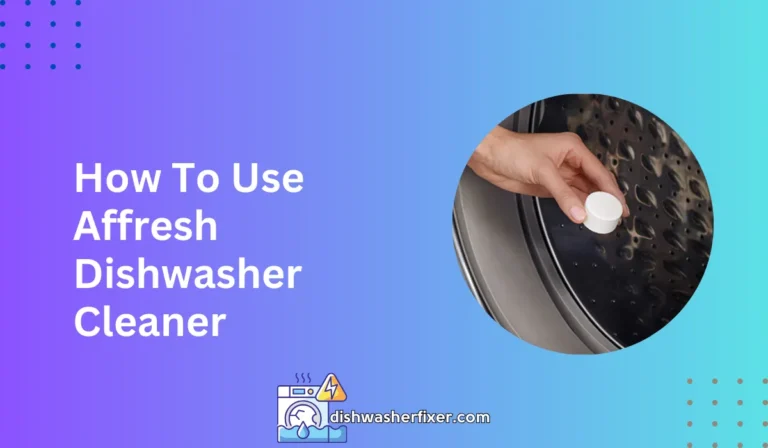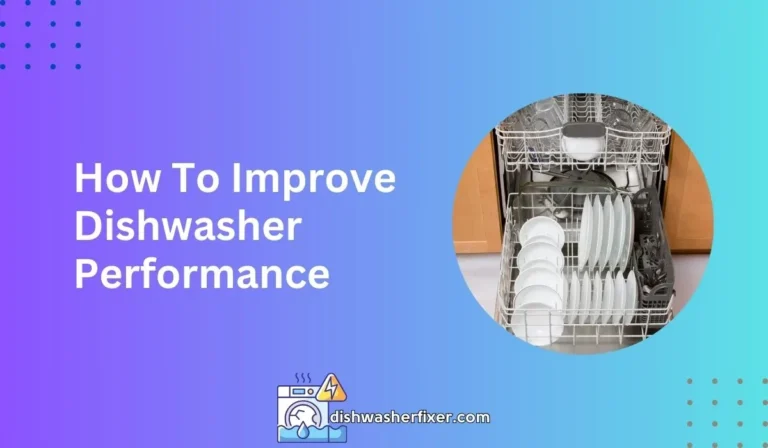How to Make Dishwasher Clean Better: 5 Expert Tips
To make a dishwasher clean better, ensure it’s not overloaded and that the spray arms are unobstructed. Use a high-quality detergent and clean filters regularly. For enhanced performance, periodically run a cycle with a dishwasher cleaner to remove buildup.
Regular Maintenance and Cleaning

Clean the Dishwasher Filter
For your dishwasher to perform at its best, regular cleaning of the filter is crucial. Located at the bottom of the machine, the filter traps food particles and debris. Over time, this can lead to clogs and affect the efficiency of the appliance.
Begin by removing the filter according to the manufacturer’s instructions. Soak it in warm, soapy water, and gently scrub to remove any buildup.
Rinse thoroughly before placing it back. This simple step, done every month, can greatly improve your dishwasher’s cleaning power.
Wipe Down the Door Gasket
The door gasket is the rubber seal that runs along the edge of the dishwasher door. It plays a pivotal role in preventing leaks. However, it can also collect grime, leading to a less efficient seal and potential odors.
To clean it, gently wipe it down with a damp cloth. For stubborn residue, a solution of equal parts water and vinegar can be used to ensure a thorough clean.
Doing this regularly helps maintain the integrity of the seal and the overall cleanliness of your dishwasher.
Check and Clean the Spray Arms
The spray arms in your dishwasher are vital for distributing water during a cycle. However, they can become clogged with food particles or mineral deposits from hard water.
Inspect the arms for any blockages and use a toothpick or similar tool to clear the holes.
It’s also a good idea to occasionally detach the spray arms, if possible, and rinse them under high pressure water to remove any hidden debris. This ensures that water can flow freely, giving your dishes a thorough clean.
Deodorize and Remove Buildup with Vinegar
Vinegar is a fantastic natural cleaner and deodorizer for your dishwasher. To utilize its benefits, place a cup of white vinegar in a dishwasher-safe container on the upper rack.
Run the dishwasher on a hot water cycle. The vinegar will break down any lingering food particles, grease, and mineral buildup, leaving your dishwasher smelling fresh and functioning more efficiently.
Use Baking Soda for a Deep Clean Cycle
After using vinegar, baking soda can be used for an additional deep clean. Sprinkle a cup of baking soda across the bottom of the dishwasher and run a short hot water cycle.
This will not only help to deodorize your appliance but also leave the interior looking brighter and stain-free. Pairing vinegar and baking soda in your maintenance routine is a powerful duo for keeping your dishwasher in top-notch condition.
Optimizing Dishwasher Use

Scrape Off Food Particles Before Loading
Before placing dishes in the dishwasher, ensure you scrape off any leftover food. Large particles can clog the filter and spray arms, hindering cleaning effectiveness.
There’s no need to pre-rinse dishes thoroughly, as most modern dishwashers are designed to handle a certain amount of residue, but removing the bulk of food waste is essential for optimal performance.
Load the Dishwasher Correctly for Optimal Water Flow
Loading your dishwasher correctly can significantly impact its cleaning efficiency. Place items with soiled surfaces facing the spray arms and avoid overlapping pieces that can block water and detergent.
Ensure that tall items do not impede the spray arm’s rotation. Utensils should be mixed in the cutlery basket to prevent nesting, allowing water to reach every surface.
Choose the Right Detergent and Rinse Aid
Using a high-quality detergent and rinse aid is essential for clean dishes. The right detergent will break down food residue effectively, while rinse aid will help prevent water spots and enhance drying.
Experiment with different brands to find the one that works best with your water type and dishwasher model. Remember that powder and gel detergents often perform differently, so choose the one that consistently gives you clear, clean results.
Use the Correct Cycle for the Load
Modern dishwashers offer a variety of cycles for different types of loads. Use a heavier cycle for pots and pans with baked-on food and a lighter cycle for glasses and less soiled items.
Selecting the appropriate cycle ensures that your dishwasher uses the necessary water and energy to get your dishes clean without wasting resources.
Avoid Overcrowding the Dishwasher
Overcrowding can prevent dishes from getting clean as it hinders the spray arms’ ability to distribute water and detergent evenly.
Load dishes according to the dishwasher’s design, allowing space between them. This ensures better cleaning and reduces the need for re-washing, saving time, water, and energy.
Troubleshooting Common Issues

Addressing Hard Water Problems
Hard water can lead to mineral deposits in your dishwasher, affecting its performance and the appearance of your dishes. Water softeners or additives specifically designed for dishwashers can mitigate this issue.
Installing a home water softener system or using rinse aids with water softening agents will help protect your dishwasher and keep your dishes spot-free.
Ensuring Proper Dishwasher Leveling
Your dishwasher must be level to function properly. If it’s tilted, water may not reach all areas evenly, resulting in poor cleaning. Check the leveling by placing a leveler inside the dishwasher.
Adjust the feet as needed to achieve a balanced position. This simple adjustment can significantly improve water distribution during cycles.
Replacing Worn or Malfunctioning Components
Over time, parts of your dishwasher may wear out or malfunction. Common culprits include the spray arms, water inlet valve, and detergent dispenser.
If you notice your dishes are not coming out as clean as they should, inspect these components for damage or wear. Replacing them can restore your dishwasher’s effectiveness.
Seeking Professional Assistance for Persistent Issues
If you’ve tried troubleshooting your dishwasher and it’s still not cleaning well, it may be time to seek professional assistance. A qualified technician can diagnose and fix complex issues that are not easily resolved at home.
Regular professional maintenance can also extend the lifespan of your dishwasher and ensure it operates at peak efficiency.
Upgrading to a More Efficient Model
If your dishwasher is old and continues to perform poorly despite regular maintenance and repairs, consider upgrading to a more efficient model.
Newer dishwashers are designed to clean more effectively and use less water and energy. This upgrade can be a worthwhile investment, leading to better cleaning results and lower utility bills in the long run.
FAQs About Making a Dishwasher Clean Better
How can I prevent my dishwasher from being overloaded?
Ensure that dishes are spaced apart to allow water and detergent to circulate effectively, and do not stack items on top of each other.
What should I check to make sure the spray arms are not obstructed?
Inspect the spray arms for food particles or utensils blocking the holes and ensure they can rotate freely without obstruction.
Which type of detergent is best for a dishwasher to clean effectively?
Use a high-quality detergent, preferably tablets or pods designed for dishwashers, for optimal cleaning performance.
How often should I clean my dishwasher filters?
Clean dishwasher filters regularly, at least once a month, to prevent clogs and maintain cleaning efficiency.
Is it beneficial to use a dishwasher cleaner, and how often should it be used?
Periodically running a cycle with a dishwasher cleaner can help remove buildup and enhance performance; use it every 1-2 months or as needed.
Final Thoughts
To enhance your dishwasher’s cleaning effectiveness, avoid overloading and ensure that nothing blocks the spray arms. Utilize a premium detergent and maintain clean filters through regular upkeep.
Additionally, incorporate the use of a dishwasher cleaner in routine cycles to tackle any lingering buildup, thereby optimizing the machine’s performance.





